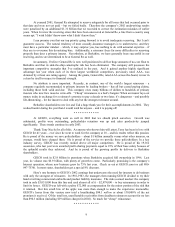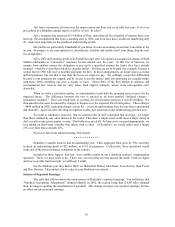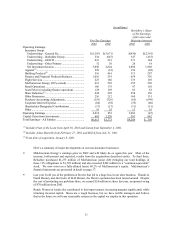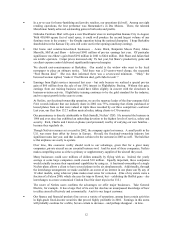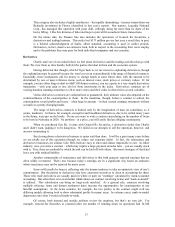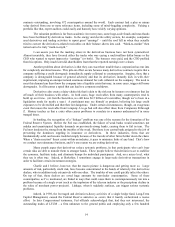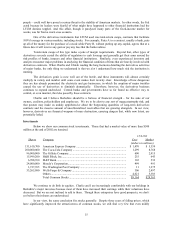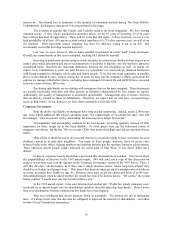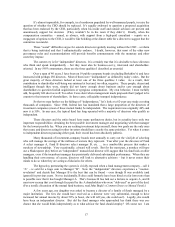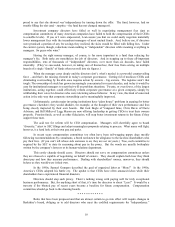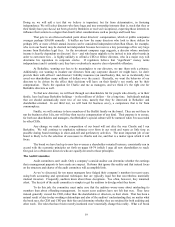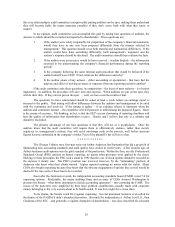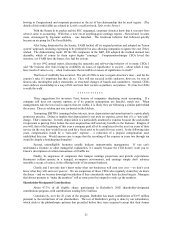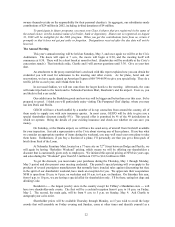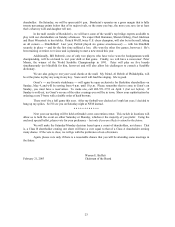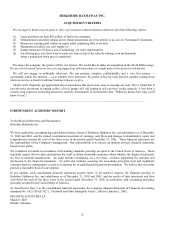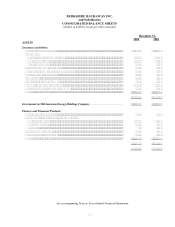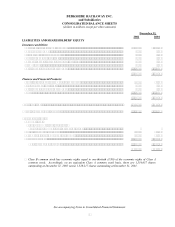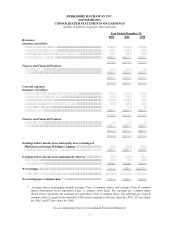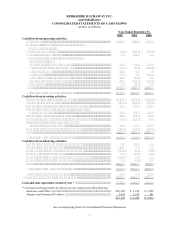Berkshire Hathaway 2002 Annual Report Download - page 20
Download and view the complete annual report
Please find page 20 of the 2002 Berkshire Hathaway annual report below. You can navigate through the pages in the report by either clicking on the pages listed below, or by using the keyword search tool below to find specific information within the annual report.19
Doing so, we will add a test that we believe is important, but far from determinative, in fostering
independence: We will select directors who have huge and true ownership interests (that is, stock that they or
their family have purchased, not been given by Berkshire or received via options), expecting those interests to
influence their actions to a degree that dwarfs other considerations such as prestige and board fees.
That gets to an often-overlooked point about directors’ compensation, which at public companies
averages perhaps $50,000 annually. It baffles me how the many directors who look to these dollars for
perhaps 20% or more of their annual income can be considered independent when Ron Olson, for example,
who is on our board, may be deemed not independent because he receives a tiny percentage of his very large
income from Berkshire legal fees. As the investment company saga suggests, a director whose moderate
income is heavily dependent on directors’ fees – and who hopes mightily to be invited to join other boards in
order to earn more fees – is highly unlikely to offend a CEO or fellow directors, who in a major way will
determine his reputation in corporate circles. If regulators believe that “significant” money taints
independence (and it certainly can), they have overlooked a massive class of possible offenders.
At Berkshire, wanting our fees to be meaningless to our directors, we pay them only a pittance.
Additionally, not wanting to insulate our directors from any corporate disaster we might have, we don’ t
provide them with officers’ and directors’ liability insurance (an unorthodoxy that, not so incidentally, has
saved our shareholders many millions of dollars over the years). Basically, we want the behavior of our
directors to be driven by the effect their decisions will have on their family’ s net worth, not by their
compensation. That’ s the equation for Charlie and me as managers, and we think it’ s the right one for
Berkshire directors as well.
To find new directors, we will look through our shareholders list for people who directly, or in their
family, have had large Berkshire holdings – in the millions of dollars – for a long time. Individuals making
that cut should automatically meet two of our tests, namely that they be interested in Berkshire and
shareholder-oriented. In our third test, we will look for business savvy, a competence that is far from
commonplace.
Finally, we will continue to have members of the Buffett family on the board. They are not there to
run the business after I die, nor will they then receive compensation of any kind. Their purpose is to ensure,
for both our shareholders and managers, that Berkshire’ s special culture will be nurtured when I’ m succeeded
by other CEOs.
Any change we make in the composition of our board will not alter the way Charlie and I run
Berkshire. We will continue to emphasize substance over form in our work and waste as little time as
possible during board meetings in show-and-tell and perfunctory activities. The most important job of our
board is likely to be the selection of successors to Charlie and me, and that is a matter upon which it will
focus.
The board we have had up to now has overseen a shareholder-oriented business, consistently run in
accord with the economic principles set forth on pages 68-74 (which I urge all new shareholders to read).
Our goal is to obtain new directors who are equally devoted to those principles.
The Audit Committee
Audit committees can’ t audit. Only a company’ s outside auditor can determine whether the earnings
that a management purports to have made are suspect. Reforms that ignore this reality and that instead focus
on the structure and charter of the audit committee will accomplish little.
As we’ ve discussed, far too many managers have fudged their company’ s numbers in recent years,
using both accounting and operational techniques that are typically legal but that nevertheless materially
mislead investors. Frequently, auditors knew about these deceptions. Too often, however, they remained
silent. The key job of the audit committee is simply to get the auditors to divulge what they know.
To do this job, the committee must make sure that the auditors worry more about misleading its
members than about offending management. In recent years auditors have not felt that way. They have
instead generally viewed the CEO, rather than the shareholders or directors, as their client. That has been a
natural result of day-to-day working relationships and also of the auditors’ understanding that, no matter what
the book says, the CEO and CFO pay their fees and determine whether they are retained for both auditing and
other work. The rules that have been recently instituted won’ t materially change this reality. What will break


